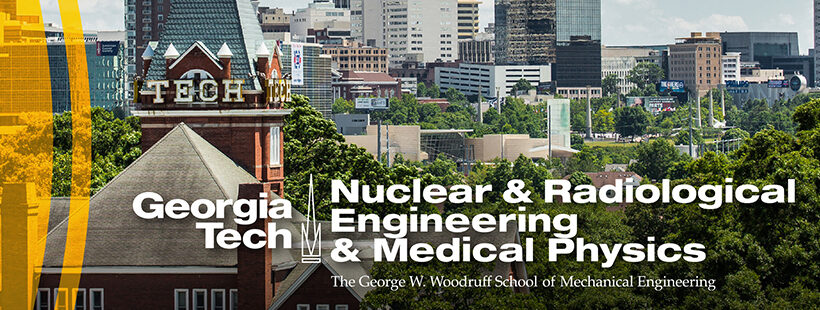 The Nuclear Regulatory Commission (NRC) has awarded the Georgia Institute of Technology a $400k grant for graduate student fellowships. The grant supports education in nuclear science and engineering, to develop a workforce capable of supporting the design, construction, operation, and regulation of nuclear facilities and the safe handling of nuclear materials.
The Nuclear Regulatory Commission (NRC) has awarded the Georgia Institute of Technology a $400k grant for graduate student fellowships. The grant supports education in nuclear science and engineering, to develop a workforce capable of supporting the design, construction, operation, and regulation of nuclear facilities and the safe handling of nuclear materials.
The Georgia Institute of Technology was one of 40 academic institutions to benefit from more than $15 million in grants recently awarded for scholarships, fellowships, and faculty development by the NRC through its Nuclear Education Program. Recipients include four-year universities and colleges, two-year trade schools and community colleges, and minority serving institutions.
The fellowship program awarded to the Georgia Institute of Technology will provide eight one-year fellowships covering up to the cost of tuition, mandatory student fees, books, supplies, and stipends for highly qualified students. The program will focus on the recruiting and retention of top nuclear engineering students who come to the Georgia Institute of Technology to obtain an M.S. or Ph.D. degree in nuclear engineering.
“The funding from NRC will be very important to our Nuclear Engineering Program,” said Dr. Samuel Graham, Eugene C. Gwaltney, Jr. School Chair of the Woodruff School of Mechanical Engineering at Georgia Tech. “We are excited to have the opportunity to recruit and support top graduate students who are pursuing their degrees in this field. Nuclear Engineering is important to the U.S. both as an energy source and for national security. The Woodruff School is looking forward to producing the engineers that will contribute to solving the challenges seen in this field.”
The Georgia Institute of Technology’s School of Nuclear Engineering was established in 1962. Nuclear engineering students pursue their program in the George W. Woodruff School of Mechanical Engineering, which merged with the School of Nuclear Engineering in 1984. The Woodruff School offers training in Nuclear and Radiological Engineering (NRE) and Medical Physics (MP) through one undergraduate degree (BSNRE), two master’s degrees (MSNE and MSMP), and one doctoral degree (PhD NRE). It is consistently nationally recognized for excellence and is ranked eighth in the nation, according to US News & World Report.
Congress authorized the NRC to provide federal funding opportunities to qualified academic institutions to encourage careers and research in nuclear, mechanical and electrical engineering, health physics, and related fields to meet expected future workforce needs.
“We are excited to have this fellowship opportunity for our graduate students. The fellowships will be targeted for top graduate students who are aiming to make an impact with their research in nuclear engineering,” said Dr. Steven Biegalski, Nuclear & Radiological Engineering and Medical Physics Program Chair in the Woodruff School of Mechanical Engineering. “The nuclear engineering field is in a state of rapid progression where next generation reactor designs will change the world’s nuclear energy portfolio. These fellowships will help Georgia Tech in our goal to educate the next generation of nuclear engineers who will revolutionize this field.”
The grant program is approaching its 10-year anniversary. More than 3,200 students in 35 states and Puerto Rico have been beneficiaries of the NRC’s program. The NRC has specifically focused on developing individuals with the skills and competencies necessary to accomplish nuclear safety, including health physics, radiochemistry, probabilistic risk assessment, seismology, and other nuclear-related areas. Through this program, NRC has funded multiple research and development, educational and training, and experiential learning projects to enhance academic excellence and to produce a future skilled workforce. The NRC announces grant opportunities on www.grants.gov, which enables the public to find and apply for federal funding opportunities. A panel of expert reviewers, from academia and the NRC, evaluates the grant proposals. The panel composition is diverse, with most reviewers having experience reviewing proposals for government agencies and advanced credentials in nuclear engineering, health physics, radiochemistry or related disciplines. Each panelist must certify no conflict of interest for the proposals they evaluate. The complete list of grants awarded and general information about the grant program are available on the NRC’s website.